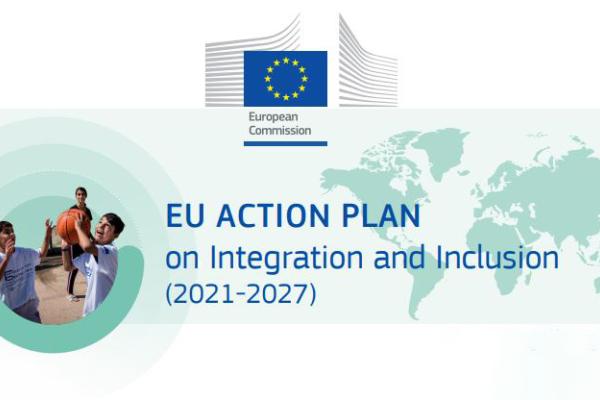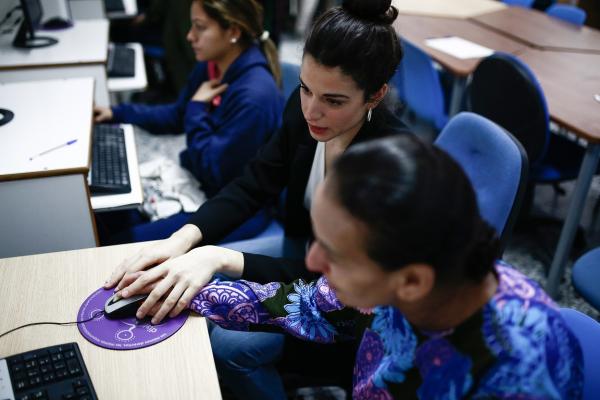As emphasised in the new Pact on Migration and Asylum, a successful integration and inclusion policy is an essential part of a well-managed and effective migration and asylum policy. It is also essential for social cohesion and for a dynamic economy that works for all.
Although national governments are primarily responsible for creating and implementing social policies, the EU plays a key role in supporting EU countries through funding, developing guidance and fostering relevant partnerships.
The action plan on integration and inclusion 2021-2027 promotes inclusion for all, recognising the important contribution of migrants to the EU and addressing the barriers that can hinder participation and inclusion of people with a migrant background, from newcomers to citizens, in European society. It is built on the principle that inclusive integration requires efforts from both the person and the host community and includes new actions that build on the achievements of the previous action plan from 2016.

The Action plan on integration and inclusion proposes concrete steps for better access of migrants to education, helth care, housing and the labour market.

The inclusion of migrants in the labour market is key to ensure their effective integration into the host societies and their positive impact on the EU economy.
Key steps and documents on EU policy on integration
- 2024Mid-term review of the Action Plan on Integration and Inclusion 2021-2027
The Action Plan states that a mid-term review of the implementation of the actions will be conducted at the end of 2024. The mid-term review will draw from consultations with the Member States and will provide an overview of the achievements in each sectoral area.
- 2020Action Plan on Integration and Inclusion 2021-2027
In November 2020, the Commission adopted the 2021-2027 Action Plan on Integration and Inclusion. The Action Plan supports Member States' efforts in developing and strengthening their integration policies, describes action that the Commission will take in this regard and encourages Member States to also take further concrete action.
- 2016Action Plan on the integration of third-country nationals
In June 2016, the Commission adopted an Action Plan on the integration of third-country nationals. The Action Plan provided a comprehensive framework to support Member States' efforts in developing and strengthening their integration policies, and describes the concrete measures the Commission will implement in this regard.
- 2016Council Conclusion on the integration of third-country nationals
In 2016, the Council adopted Council Conclusions on the integration of third-country nationals legally residing in the EU.
- 2011European agenda for the integration of non-EU migrants
In July 2011, the Commission proposed a European agenda for the integration of non-EU migrants, focusing on action to increase economic, social, cultural and political participation by migrants, and putting the emphasis on local action. This agenda highlighted challenges that need to be solved, if the EU is to benefit fully from the potential offered by migration and the value of diversity. It also explored the role of countries of origin in the integration process. A Commission Staff Working Paper: EU initiatives supporting the integration of third-country nationals, annexed to the Communication, contains a list of EU initiatives supporting the integration of Third-Country Nationals.
- 2005Common Agenda for Integration
The Commission’s 2005 Common Agenda for Integration has helped to implement the Common Basic Principles. The EU policy has been framed further by the 2009 Stockholm Programme and the Europe 2020 Strategy, where one of the headline targets was to raise the employment rate of 20 to 64-year olds in the EU to 75 %. One of the means by which to do this is by better integrating legal migrants.
- 2004Common Basic Principles for immigrant integration policy
EU cooperation on the integration of non-EU nationals has developed since the adoption of the Tampere Programme in 1999. The Common Basic Principles for immigrant integration policy, agreed in 2004, provide a strong framework for policy-making in this area. They underline the importance of a holistic approach to integration and aim, inter alia, at assisting EU countries in formulating integration policies. They also serve as a basis for EU countries to explore how EU, national, regional, and local authorities can interact in the development and implementation of integration policies. Finally, they assist in evaluating EU-level mechanisms and policies with a view to supporting future integration policy developments.
